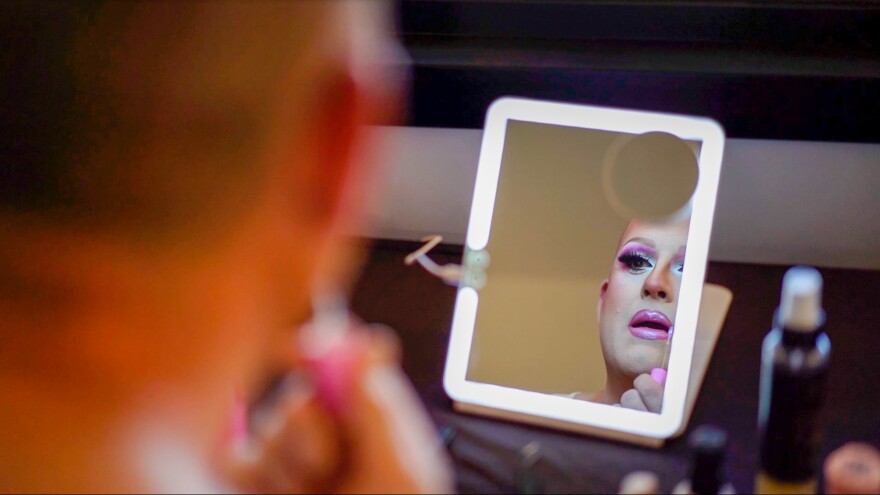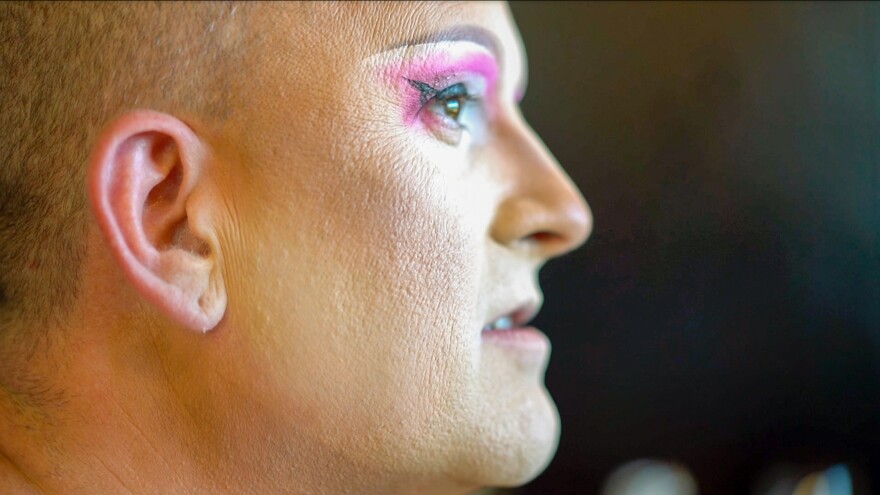The iTunes Christian music charts were crowned in late July by a historic sight: A drag queen in bubblegum pink Dolly Parton-esque curls and a dressing gown spilling over with chiffon ruffles. Everything, from her heavy eyelashes to her rainbow jewelry and bright blue guitar, insisted she would not be ignored. She beamed under the large capital letters of the album title, “Bible Belt Baby,” and her drag name, Flamy Grant. Both titles insisted that Christianity and drag could — and would — be cradled together.
Though the nearly year-old album shot to the number one spot in a day, Flamy Grant took decades of struggle and resilience to be born from Matthew Lovegood.
Lovegood grew up in what they describe as a religious bubble outside Asheville, North Carolina, shuttling between home, school and a fundamentalist church where women covered their hair and were not permitted to speak.

Now out as non-binary and gay at 41, Lovegood learned early not to explore gender; to resist the desire to try on their mother’s dresses; to sacrifice themselves to fit in better with the other boys.
“I spent a long time avoiding this fate right here,” Lovegood said, laughing.
They became a worship pastor, and in their late 20s moved to San Diego to start a new church. Far from home, they began to question the beliefs that had been handed to them.
“Realizing that I’m gay, and that’s not going to change, and I am going to embrace that about myself,” Lovegood said. “When I did, I got kicked out of that church.”
Lovegood lost not just a job and community, but the security religion offered them.
“This is the best space for you, you’re safe here with us,” Matthew said the church ingrained in them. “As long as you do the right things, believe the right things, behave the correct ways, then everything’s going to go well for you. And if you don’t, your life will turn on its head.”
Fear and shame, Lovegood said, were used to manipulate.
“And that’s a story I’ve heard over and over again from people who’ve had to do the exact same thing,” Lovegood said. “Fear is one of the things that has kept us in places that are hurting us and harming us longer than we should have stayed.”
Lovegood made what they called a public exit from the church. They started a podcast about deconstructing their faith called “Heathen.”
“I didn’t want to be associated with the faith,” they said. “Especially here in America, I felt it was too toxic to take on that label and try to fix it.”
And then Lovegood found drag. Or as they said, drag found them.

“When I started doing drag, it was inner child work for me,” they said. “Sitting in my bedroom, painting my face, feeling my oats and having a good time.”
For their whole life, Lovegood said, they believed something about them was “broken and wrong and sinful and unworthy and unlovable.”
Now, in the hours spent in front of their mirror playing with color and sparkles and everything that had been forbidden, they began reparenting themselves. They told themselves, “You’re OK, baby.”
Drag, they said, gave them permission to believe in their own goodness.
It was ultimately through doing drag that they decided to stay in the Christian Church.
“I feel like it’s important for some people to take up space in the church when there’s no representation for the thing that you’re doing,” they said.
Flamy Grant — a play on Lovegood’s childhood Christian music hero, Amy Grant — embodied what seemed like a contradiction and gave Lovegood the boldness to declare that it didn’t have to be.
During the pandemic, a pastor invited Lovegood to give a virtual sermon in drag.
“I had no idea what that was going to look like. I’d never seen a drag queen, king, thing give a sermon. That’s just not something I had context for,” they said.
So they made a practice video on TikTok, putting on their face and giving a 60-second homily. It went viral.
@flamygrant What’s your second act gonna be? #dragspirituality #dragtransformation #dragmakeup #makeuptransformation #dragqueen #dragqueensoftiktok #secondact
♬ original sound - Flamy Grant
“I spent the entire day just scrolling through comments of people saying ‘This makes me feel seen and makes me feel safe,’” they said. “Which was what drag was doing for me — making me feel seen.”
It was the first time they saw that their drag was not just for themselves, but for other people too.
Lovegood decided to add a spiritual component to their drag by writing songs in the voice of Flamy Grant. The album “Bible Belt Baby” was born.
They wrote the album to process their religious trauma. Every time they performed as Flamy, they would connect with someone who shared a similar experience.
“Somehow, makeup and a wig and a guitar can be a bit of a balm to that stuff,” Lovegood said.
They released the album in October of 2022.
At a Nashville concert in July, they posed as Flamy Grant in a photo with a few well-known Christian musicians — Derek Webb, Jennifer Knapp and Tiffany Arbuckle.
“Somehow that photo got to Sean Feucht,” Lovegood said.
Feucht is a Christian singer-songwriter known for a failed Republican run for Congress and, in 2020, hosting worship events that drew crowds of thousands in protest against pandemic public health orders.
Feucht took to twitter.
If you're wondering the end goal of the deconstruction movement in the church, then look no further than former worship leader @derekwebb's new collab with a drag queen.
— Sean Feucht (@seanfeucht) July 26, 2023
These are truly the last days. https://t.co/sgvzGFoRgu
“If you’re wondering the end goal of the deconstruction movement in the church,” he wrote, “look no further than former worship leader Derek Webb’s new collab with a drag queen. These are truly the last days.”
“End goal? Baby, we’re just getting started,” Flamy Grant retorted with a kissy face emoji.
Feucht’s response set off the events that launched Flamy Grant in the national spotlight.
“Good for us hardly anyone listens or cares what you do,” Feucht wrote.
“Which is just not something you say to a drag queen,” Lovegood said, eyes twinkling. “You just don’t. Because if there's one thing that drag performers everywhere have in common is that we know how to capitalize on a moment. We know how to take something that is intended for our harm and turn it into our good.”

Lovegood asked their TikTok followers to help the closest thing they had to a worship song on their album, “Good Day,” to break onto the iTunes Christian music charts.
“I was like, ‘Maybe I can just crack the charts,’” Lovegood said. “It would be a big deal just to have my album cover with my big pink wig and painted face. Open up your iTunes and see a drag queen under ‘Christian.’”
They posted the video request and went to bed. When they woke up, they said, the song was at number six. By the end of the day, it topped the chart along with the entire album, which lingered there for more than a week.
Flamy Grant soon graced the headlines of Rolling Stone, Billboard, Paste Magazine and more. New followers poured in on social media.
“Sean said that hardly anyone listened or cared what I do,” Lovegood said. “And I rolled the dice knowing what I know about the queer community, and the ex-evangelical community, and the deconstruction community.”
Lovegood cracked a smile: “That was a good bet.”
Lovegood said although they do drag to have fun, and enjoy being a little snarky online, they recognized the weight of this moment. A lot of people are watching.
“I want them to see that there is such a good life for you after you leave high demand, toxic religion,” Lovegood said. “And that you don’t have to leave your entire faith structure. You can stick around and just do it better than it’s been done before.”

In a couple weeks, Lovegood plans to move with their husband back home to North Carolina.
“I’m still a Southern kid at heart,” they said. “And I feel like my drag will fit well in the South ... I want to make an impact where laws are literally being passed against queer people, trans people.”
They admit they’re scared. But they said it helps to think of all the queer people living their lives already in North Carolina, Tennessee and Florida.
“It’s an anxiety I can live with, I think,” they said. “Especially knowing that there are communities everywhere that are safe and accepting and will celebrate me.”
Nestled in the middle of the “Bible Belt Baby” is a song written from Flamy to young Matthew Lovegood.
“How many fools tried to write your story?” Flamy sings. “How many names did they give you before we finally drove out of the county, drove away from the only town we knew?
“It was so rare to find a place where you could dream out loud,” she tells Matthew. “But even though there were years we spent apart, I have always been the desire of your heart.”





